When planning my reads for my blog project around weddings and honeymoons in vintage crime fiction, surprisingly this was one someone had to remind me of. The fact the victim is on their honeymoon somehow managed to pass me by when I read it the first time round and when I have watched adaptations. I am not sure why, hopefully I am not the only one. This is the last book on my original list, (I have some new ones still to read) for this project and I must admit I have been putting it off. Not because I don’t like the book, but because it is a story I am very familiar with, and it is also one which has been talked about a lot online. Seven years into blogging and I still get a bit daunted with reviewing a Christie novel, (despite having reviewed 33!).
WARNING – This post contains spoilers about who did the crimes, so it is best read if you already know the plot to the story.
Synopsis
‘The tranquillity of a cruise along the Nile is shattered by the discovery that Linnet Ridgeway has been shot through the head. She was young, stylish and beautiful, a girl who had everything – until she lost her life. Hercule Poirot recalls an earlier outburst by a fellow passenger: ‘I’d like to put my dear little pistol against her head and just press the trigger.’ Yet in this exotic setting nothing is ever quite what it seems…’
Overall Thoughts
Before starting this mystery, I remembered that John Curran, by looking through Agatha Christie’s notebooks, had discovered that Miss Marple was originally meant to be the sleuth in this one and as I began to read, I wondered what effect this would have had if this had happened. The opening chapter has quite a Miss Marple setup. Unexpectantly, for a novel famously known for its Egyptian setting, it starts off in an English country village, with some of the locals discussing the arrival of Linnet Ridgeway, who has bought the country estate nearby. Her wealth and her carefree existence are commented on, yet until I re-read the book I had completely forgotten this scene. However, it is not long before the narrative gains its more exotic setting and perhaps at this early stage in Jane Marple’s sleuthing career, Christie had thought it best to leave her in country villages rather than casting her abroad. Poirot may have seemed a more natural choice. (I am aware that Miss Marple does leave the UK for one of her cases, in A Caribbean Mystery (1964), but by this point Christie had written far more stories involving her.)
If Miss Marple had featured in Death on the Nile,I think she would have differed from Poirot in how she perceived the central trio of the Doyles and Jacqueline Bellefort. Would Miss Marple have been more outspoken to the female characters? I have a feeling she might have been less sympathetic towards Jacqueline. I also wonder whether she would have seen through Simon Doyle more readily than Poirot does. Would one of her village parallels set her off on the right track sooner? Unlike Poirot, Miss Marple does not face much in the way of love triangles in her cases, although one which sort of fits the bill is ‘The Blood-Stained Pavement’ (1928). It’s curious why this plot device is largely avoided in the Marple stories.
If it was not a murder mystery then the exposition of Death on the Nile could almost be regarded as the opening of a romantic comedy with the female protagonist Linnet being set up as the rich, young, beautiful, smart, and independent woman who has it all, all except love. If this was a romantic comedy then the arrival of Simon Doyle, an impoverished younger son of country gentry would signal the female lead’s love interest. Yet we know this is not a romantic comedy, nor a fairy tale with a happy ending. This is a murder mystery, with Linnet taking the role of the primary murder victim. The many privileges and advantages she has in life are seen by some as ‘not fair’. Her desire to have passionate love in her life, encourages her to create her own fairy tale romance, but at a cost. Hers is a fairy tale which turns sour. Why? I think for two differing reasons. From Simon’s side, the fairy tale is fake, one which is contrived at and fabricated. He is fulfilling the role because he has an eye on her money. Linnet also contributes to the souring of her own romance, because as the opening chapters portray it, she has taken something which didn’t belong to her. Simon was already engaged to Jacqueline and theft in fairy tales can have devastating consequences. I appreciate that this is quite objectifying language to use in regards to Simon, but it is the semantic field within which the mystery operates and in some ways it is subversive of Christie to reverse the usual trend of objectifying women.
One of the things which stood out to me in the first few pages was how Linnet is presented to us, probably because this section of the story is the part I remember the least. A lot of the comments made about her character are by her friend and socialite Joanna Southwood who says to her:
“You are the most practical creature!”
“You’re so devastatingly efficient”
“You’re so frightfully good at doing the right thing.”
In these comments, Linnet is arguably shown in a more masculine way or perhaps a less feminine one. She is delineated as being business-like, unemotional, sensible, and upstanding. The last one in some ways does not fit with the rest and I would say the story sets this last one against the other qualities, as when Linnet decides to take a strong business-like, no-nonsense approach to winning Simon’s affections, this decision does not sit well with her sense of right and wrong. Nevertheless, this is a part of her she tries to silence, although when talking to Poirot her uncomfortableness with her past actions does rise to the surface a little. Joanna goes on to describe Linnet as “high-handed” (a quality which I think makes Linnet a less sympathetic figure) when she refers to the way she relocates tenants in some less salubrious cottages on her land, as they overlook where she will put her new swimming pool. Joanna sums her up as “a beneficent tyrant” and this is a murder victim type Christie returns to in later books such as Ordeal by Innocence (1958).
There are not many wedding/honeymoon life lessons to be had in Death on the Nile, but the ones that are there, are important…
Life Lesson No. 1: Don’t break up your friend’s engagement and marry her fiancé instead.
An obvious one, but aside from the fact everyone is going to think more poorly of you, there is also the unpredictability surrounding what your ex-friend will now do. What form will their revenge take? It could be nothing more than bad mouthing you in society, but it could also entail stalking you and your own demise.
Life Lesson No. 2: Avoid tours around ruins with loose stone masonry. If the masonry/rocks are at the top of a hill, don’t sit at the bottom of it.
You are asking for trouble if you do. There is no point in handing spontaneous killers such opportunities on a plate.
Life Lesson No. 3: Avoid honeymoons in confined spaces such as boats, particularly if you have not followed life lesson number 1.
However, such limited space is great for the detective novel reader, as the boat becomes the equivalent of a country house on the water. There are servants who might overhear or see something they shouldn’t and like in a snow bound country house mystery novel, guests who don’t get along, are stuck in each other’s company. The boat setting also helps to curb the cast of suspects, although in this case Christie confounds this with a healthy number of passengers who could be suspects.
I know some reviewers have found more sympathy with Linnet, but I struggle to do so (although I am not suggesting that she deserved to die), and this re-read only affirmed this difficulty. I think the principal reason for this is that Linnet is not stupid, she is aware of how she has far more advantages than most people in life, and so for me she should know better. I guess this is why I was surprised to notice in the re-read that Joanna sees her as a scrupulous person. Perhaps this is why Joanna cites a couple of incidences in Linnet’s past where she has done someone else a good turn, (even if the execution of it is high-handed), as in the present day of the book the reader only has Linnet’s present action of marrying her friend’s fiancé, to judge her upon.
Poirot does not seem keen on Linnet either. He finds her voice to be a ‘trifle arrogant’ and that she has a ‘charming autocratic manner’. Furthermore, Poirot’s sympathies for her have limitations and if anything he has greater sympathy for Jackie de Bellefort. For example, when talking with Linnet Poirot says: ‘I must sympathise with you, Madame – especially as I imagine that you have not often had to put up with things.’ The imperative ‘must’, makes his sympathy sound forced and as though he is heeding social expectations and that the sympathy is superficial in nature. I think this is reinforced by the sarcasm at the end of the sentence.
Linnet endeavours to defend her decision to marry Simon to Poirot by trying to present her side as the logical and reasoned one. She suggests that Jacqueline and Simon were incompatible and therefore it was okay to break them up. However, Poirot has a biblical allusion to offer her, namely the occasion when King David takes another man’s wife (having sent the man to a dangerous part of battlefield to ensure his death) and the prophet Nathan challenges his behaviour with a story about a rich man stealing a poor man’s only lamb. I think this allusion echoes my own feeling that Linnet should have known better. Poirot refuses to take her on as a client, an action I remember him doing three years prior to this case in Murder on the Orient Express (1934). In that story he refuses to take Samuel Ratchett on as a client and whilst I am not saying Linnet is in the same category as him for wrongdoing, it is interesting that both soon to be victims are wealthy but that this does not sway Poirot and that in each case he sees their predicament as the consequences of their own choices and thereby something they have some responsibility for.
In the opening chapters when the love triangle emerges and Poirot then talks to all three principal characters, we see Simon being shown to be in a passive position, particularly if we look at him through the lens of the accounts Linnet and Jacqueline give about the breakup of the first relationship and the formation of the second. Interestingly Poirot on the other hand interjects some agency into Simon’s part, saying he allowed things to happen and that he still made choices. This differs to the weaker infantilised position that the women give him, such as when Jacqueline suggests that Simon couldn’t help it. That Linnet’s charm and wealth were too strong an attraction. I appreciate that this is partially moonshine to throw Poirot off the scent, but even at the end of the story, Jacqueline sees Simon as a child, with a child’s unreasonable desire for personal satisfaction and pleasure. She explains to Poirot in the final pages how she joined in with the murder scheme, as she saw Simon as vulnerable, as someone who needed protecting and looking after, as she was sure he would get caught if left to his own devices. This is naturally fuelled by her intense love for him. Interestingly, Poirot taps into this idea soon after meeting Simon, thinking to himself that “the Anglo-Saxon, he takes nothing seriously but playing games! He does not grow up!” This presents Simon as a Peter Pan figure who unthinkingly views life in terms of sportsmanship and Simon feeds into this idea himself when he talks with Poirot about how Jacqueline needs to “play the game” and to take the dissolution of their relationship ‘like a man’. However, once more we know that Simon is trying to establish his negative attitude towards Jacqueline to keep people from thinking that there is still a connection there and I think Simon uses his social position as a form of social disguise.
This bears fruit when Mrs Allerton and Poirot discuss together what sort of crimes the other guests would commit. When it comes to Simon, Poirot replies: “A very simple crime – a direct short cut to his objective. No subtlety about it […] he would not be ingenious.” Whilst this perception of Simon is not wholly inaccurate, it does conceal the notion that Simon could be involved in the later murder of Linnet, which is seen as a complex crime. Interestingly when it comes to Linnet, Poirot thinks she ‘would be like the Queen in your Alice in Wonderland, “Off with her head”’ and Mrs Allerton agrees saying, ‘The divine right of monarchy! Just a little bit of the Naboth’s vineyard touch.’ Again, we have another Old Testament allusion relating to another occasion when a rich king uses force to take a valued possession from a poorer person. In both the case of the vineyard and the time when King David contrived to get Bathsheba as his wife, the man “taking” the item or person suffered as a consequence and this is paralleled in Death on the Nile. It intrigued me that Poirot is unsure about the sort of crime that Jacqueline would commit and again this conversation muddies the investigative waters later on. Jacqueline is smart enough to have concocted the crime, but Poirot perceives her as being someone who could only kill in hot blood, and the killing of Linnet is not typified in that way. Of course that is where Simon comes in and the “hot blooded” killings later in the book are performed by Jacqueline, not least because she is the only one in their partnership who is mobile.
Simon Doyle is meant to be the one who gets pushed around, who is beguiled into marrying another woman, but you can see how he gets Linnet to decide things his way, such as going on the Egypt holiday. He professes that he did not want to go there, and Linnet says he wanted to take her to Spain, but I think the way he presented his alternative suggestion ensured the comfort and luxury expecting Linnet would never take him up on it.
There is a long run up to the murder of Linnet, so much so that I think this is a key reason why this mystery was not serialised before being published as a novel. With newspaper stories there is an expectation for a body early on. However, I think Christie’s approach had several advantages. Firstly, it allows the readers to get their heads around a large cast of characters and I found it surprisingly easy to keep them all in my head. The longer run up also enables various plot points to be introduced more naturalistically, rather than rammed into one or two chapters. I know some do not enjoy the delay in getting to the murder, thinking it takes too long, but I feel that Christie does not waste this space, planting the seeds for a lot of future plot points. Once the murder occurs events move swiftly like rows of dominoes knocking each other over, something I think the runup promoted.
In the final paragraphs of the novel, Mrs Allerton says to Poirot that ‘Love can be a very frightening thing.’ To which he replies: ‘That is why most great love stories are tragedies.’ This, among other things, got me thinking about the possible connections between Death on the Nile and Greek tragedy. Whilst there are other variants of tragedy such as Shakespearian and Jacobean, (and I have written a post about connections to the latter in a separate post), I think my brain leapt to the Greek brand as when Jacqueline builds up her performance as the wronged woman who will seek revenge on the two people who have thwarted her love, the character who came to mind was Euripides’ Medea, who executes a violent revenge plan when her husband (for whom she sacrificed a lot, including harming her family’s own interests) decides to ditch her and marry a local princess with better social standing instead, (better for the kids don’t you know?) Moreover, although detective novels do not necessarily indulge in the concept of fate, Jacqueline when talking to Poirot sees herself on a road she cannot get off and at various stages in the story it seems like there are forks in the road that could have prevented the calamities of the narrative, if a different decision had been made, such as the moment Linnet decided she wanted Simon for herself, to the moonlit evening when Poirot asks Jacqueline to turn back from what she is planning to do.
In very basic terms tragedy, as a genre, is about a hero or heroine, of good social standing and of reasonable, or noble you might say, character and the given story will chart their downfall. This downfall tends to be contributed to by their hamartia, tragic flaw or weakness, and the resulting consequences it causes other characters to do, as well as fate and the “gods”. The protagonist in a tragedy usually has an overwhelming desire to attain a goal, and these can often be good and selfless ones, such as burying a beloved brother in defiance of state law in Sophocles’ Antigone and discovering the murderer of a parent in Sophocles’ Oedipus Rex.
It is interesting mapping this genre on to Death on the Nile and it is more complicated given we arguably have three tragic figures. I say figures as if anything we have more tragic antiheroes. Jacqueline and Simon have their fatal flaws – the former is compelled down a dark road due to the grip of all consuming love, with a modicum of pride and the latter’s downfall is arguably due to avarice, his strong desire for money no matter the cost. The plan to murder Linnet is culmination of more than one goal. Simon’s goal is satisfying his yearning for luxury, whilst Jacqueline’s is to hold on to Simon and to save him from himself. Neither of these goals is noble and both had other choices they could have made. The closest to a tragic heroine is Linnet, who in society’s eyes would be deemed as “great” and as “successful”, and her downfall is perhaps due to the way nature and nurture have conditioned her to expect to get everything she wants, combined with pride in her ability to judge what is best for people, since she does try to convince Poirot that Simon was inappropriate as a husband for Jacqueline.
Furthermore, whilst the “gods” might not be operating in this story, Poirot could be said to be taking on their role, as if he had not been on the boat then there is a good chance Simon and Jacqueline would have got away with their crime. Perhaps it was fate that Poirot had booked on to the same cruise. Although Poirot feels sorry for Jacqueline, this does not sway him into letting her and Simon go free. He is prepared for their likely fate of being executed for murder, an option he mostly adheres to, although Christie fans will know of an exception. This fidelity to a legal system involving capital punishment chimes in with not only Old Testament justice, but also justice as voiced by characters in Greek Tragedy. For example, in Aeschylus’ The Libation Bearers (458BC), Electra says: ‘And for our enemies -/ Let your avenger show himself,/ Bring justice, death for death…And of Justice most of all, Justice triumphant.’ The chorus in this play also echoed this with: ‘Come, Justice, to our side./ Venom for venom: the debt is due./ Death for death,/ Blow for blow.’
One key component of Greek tragedy is the peripeteia, or the reversal. This is when a situation seems to be going one way, usually a good way, but then the situation swiftly goes pear shaped and the hero finds themselves in a crisis, often of their own making, to an extent, due to their hamartia. Focusing on the tragic trio in Death on the Nile, I think a key reversal involves when Simon lands the job working for Linnet. Initially this is good news as his wage will enable him and Jacqueline to marry, as he had recently lost his job. However, in two ways this situation reverses. The red herring reversal is that Simon’s new job means Jacqueline in fact loses her fiancé to Linnet. However, perhaps the real reversal of this situation is that it puts temptations in the way of Simon and leads to Jacqueline and himself conspiring to reverse the situation to their own good e.g. let Simon marry Linnet for her money, murder her and then he and Jacqueline can marry and have Linnet’s money. Another reversal perhaps is that Linnet is said to be incredibly rich, and Simon expects a big pay out after her death, yet it transpires that her American trustee Andrew Pennington has embezzled part of her fortune and it is unclear how much of it is left. If Simon and Jacqueline had got away with murder, then it is possible that their future married bliss might not have been so rosy if there was a lack of funds.
The idea of reversals also occurs more generally in the story, due to the detective plot formula. W. H. Auden talks about this in his essay ‘The Guilty Vicarage’ (1948). He wrote that:
‘As in the Aristotelian description of tragedy, there is Concealment (the innocent seem guilty and the guilty seem innocent) and Manifestation (the real guilt is brought to consciousness). There is also peripeteia, in this case not a reversal of fortune but a double reversal from apparent guilt to innocence and from apparent innocence to guilt.’
This is borne out by the conclusion which reveals the true murderers of Linnet Doyle, Louise Bourget and Salome Otterbourne, and shows the other passengers to be innocent of those crimes, although other guilt is exposed including embezzlement and jewel theft. Finally, you could say that Jacqueline and Simon’s murder plan reverses as well, as initially it looks like they have both convinced Poirot that neither of them could have murdered Linnet, as they both have strong alibis, yet this is reversed when it transpires that the maid saw Simon outside of the saloon when he should have been immobilised inside with a leg wound, (another act of fate?). Things arguably unravel from here for the pair.
Greek tragedies usually have, but not always, moments of anagnorisis or recognition, in which the protagonist moves from a place of ignorance to one in which they learn the truth of a situation. Oedipus learning that he killed his own father, is the classic example. It was harder to find traces of this in Death on the Nile. Jacqueline especially goes into the murder scheme with her eyes wide open as to what she is doing and why and she is under no illusions regarding the calibre of man Simon is. The self-deception is perhaps more to do with whether he is worth the sacrifices she has made, and I am not sure this has gone even when they are caught. We do not have any dialogue from Simon once his guilt is announced, so it is hard to judge whether he has an anagnorisis moment. It is Jacqueline’s perceptions of their crimes which is prioritised in the finale, which I found interesting.
And just when you thought I had run out of links to Greek tragedy, there are some more. In the run up to the murder, especially the earlier chapters, I felt that the hotel and boat guests occupied a role at times akin to that of a Greek chorus, reflecting and commenting on the events that had happened, usually those pertaining to the Doyles and Jacqueline. Mrs Allerton particularly fulfils this role, and it also comes through in the way that we learn about Linnet’s marriage to Simon, which is via Mrs Allerton and her son Tim, who comment on how this event has affected others.
The last connection I wish to mention is the trope of the love triangle, as this is element of Greek tragedies and myths. An example can be found in Sophocles’ Women of Trachis (450-425BC) and in this play and other fiction across the centuries love triangles are often shown to be messy and disastrous for those involved. The idea of love triangles not ending well, was amusingly described in 1921 in the following way:
‘“Al. Bert: “How do these love triangles usually end?”
Phil. Bert:“Most of them turn into a ‘wreck-tangle.”’
The joke, written anonymously, appeared in many American newspapers including the Brooklyn Life and The Wichita Daily Eagle. However, interestingly, the word ‘wreck-tangle’ had been going since the mid to late 1800s and had more of a maritime meaning. But I digress…
Death on the Nile is one of the few mysteries in which Agatha Christie’s series character Colonel Race appears and he does so quite late, arriving a 100 pages in. He is on a mission of his own, but he also becomes a useful second in command for when the murder of Linnet occurs. I thought it unusual that he turns up so late, as usually Poirot’s deputies are with him from the get-go. However, I wondered if Poirot had been with a holiday companion like Captain Hastings, then this might have hindered the plot by distracting us from the other boat passengers. With Poirot flying solo for quite some time this gives us more opportunity to get to grips with the cast of suspects and without the distortive or myopic viewpoint of someone like Hastings.
I think there is a lot of good misdirection in this mystery, as well as some subtle clues, such as the fact that Simon and Jacqueline deploy the same sun/moon simile to describe his defection to Linnet. This verbal repetition occurs in two conversations Poirot has within 24 hours with the characters independently and I thought it was an interesting early signal that maybe those two were still connected, despite not appearing so on the surface. There is also the fact that when we see some of the other passengers take Jacqueline to her room once she has supposedly shot Simon in the leg, their actions are described as ‘hurried’ and that they ‘reacted promptly’. Phrases like these imply that not much time has elapsed between leaving and then returning to Simon and thus suggesting that Simon could not have done anything in the time gap. The alibiing of Simon and Jacqueline is clever in my opinion, as it looks less suspicious as their guilt is only possible if they are both in it together and that seems like less of a possibility. Death on the Nile has a high number of subplots, but I felt on the whole they were woven into the narrative well. My only criticism would be is that Colonel Race’s subplot involving a foreign enemy agent is rather weak and that it is very obvious who the culprit for that crime is.
One of the gripes I had with Murder in Mesopotamia (1936) earlier this month, is that Poirot says he cannot prove any of his solution and that it is only becomes proven because the killer cracks and admits all. A similar situation arises in today’s read, as Poirot says:
‘But you understand that, although I know what must have happened, I have no proof that it happened. Intellectually the case is satisfying. Actually it is profoundly unsatisfactory. There is only one hope – a confession from the murderer.’
But for some reason, and I have yet to put my finger on it entirely why, this was less problematic for me in this novel, and I found the ending more satisfying than I did in Murder in Mesopotamia regarding this angle. I wonder if it helped that the confession is off the page and Simon is psychologically the one most likely to blab. Furthermore, the narrative swiftly moves to Jacqueline’s heart to heart with Poirot which provides an interesting sidelight on her relationship with Simon.
However, overall this was an excellent read and I think readers who have only seen a film or TV adaptation, still have lots to look forward to in reading the original story.
Rating: 4.75/5 (I think what gave this a higher rating than say 4.5/5 was that despite being so familiar with the plot, I still really enjoyed the book, and I got a lot out of the reading experience. This book has more to offer than the answer to whodunit.)
For Better or Worse: It should come as no surprise that this read was definitively for the better!
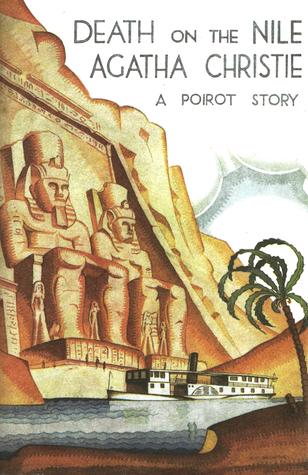

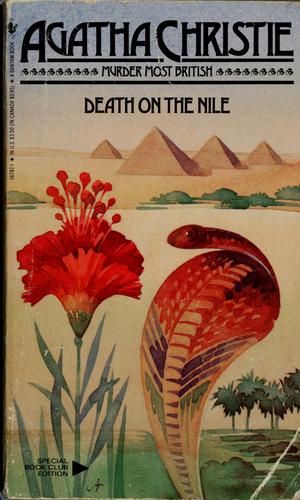

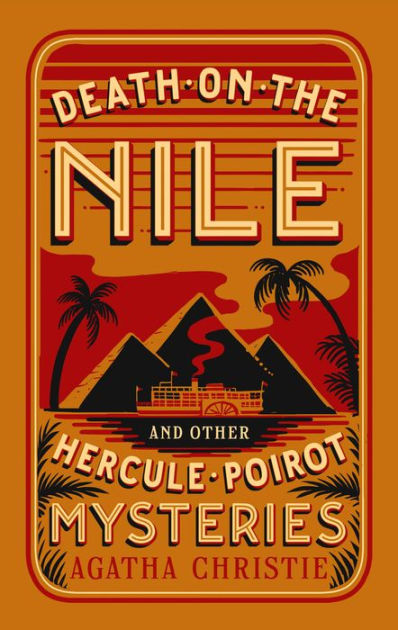

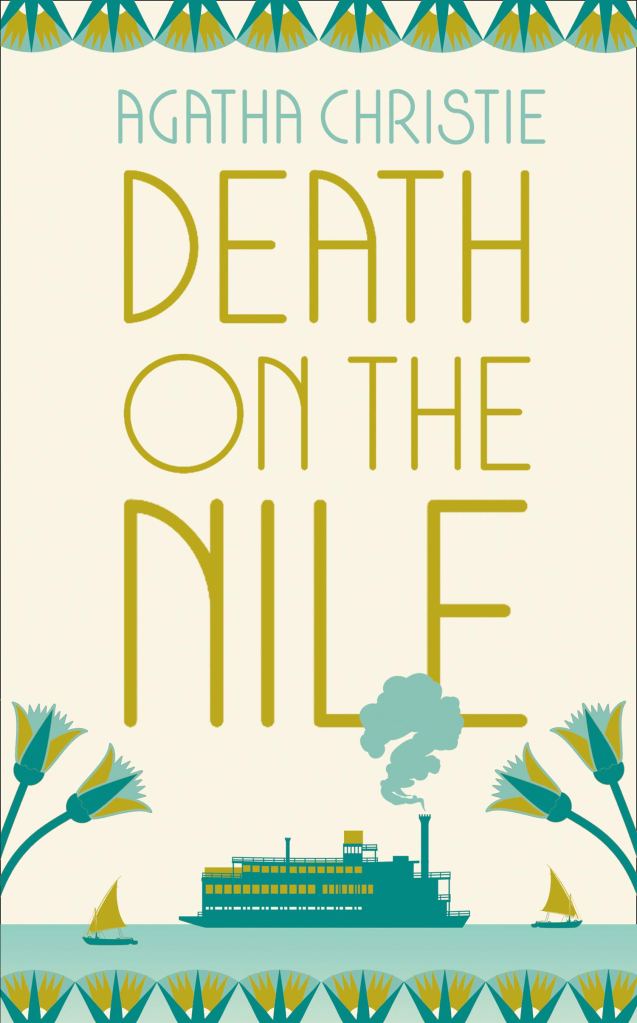

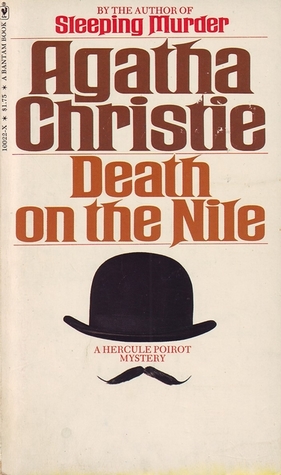


I am wondering why throughout this review, Doyle’s first name is referred to as Simeon. Is there an edition of this novel in which his first name is spelled with an “e” in it?
LikeLike
No it’s just a typo which I have now fixed.
LikeLiked by 1 person
A really interesting take on a book which as you say, is much-discussed. I think the difference between Murder and Mesopotamia is Poirot’s connection with the killer, and our knowledge of their inner feelings. The killer in Mesopotamia conceals more of their “essential nature”, and in a very unconvincing way from a narrative standpoint – there are no real clues to that aspect of their personality, other than the fact that they are the killer. Whereas in Nile the killers are obviously concealing something, but they are still acting “as themselves”, so we have more connection to them, or at least to one of them. And I think the Greek Tragedy aspects you point out really help sell the ending in Nile. There may be equally little proof in either book, but we don’t mind that in Nile because the conclusion fulfils our expectation of a tragedy, and so it feels “right” (aside from any moral qualms the reader may have about this method of “disposing” of the killer).
Also interesting – the clue you mention about the similar phrasing. Like all good clues it can seem to point in another direction. The unwary reader may well notice the repetition and instead conclude that it’s a sign Jackie and Simon really are meant for each other, and will happily reconcile – which they seem to do after Linnet’s death. This idea seems familiar to me so maybe that’s really what I thought on my first reading.
LikeLiked by 1 person
I think you’re right about the difference between the killers in MiM and DotN. I think we get much more from DotN in terms of character. Your comment on the Greek tragedy aspects making the ending feel right, is an interesting one. Despite the lack of proof the solution fits and fits convincingly. I hadn’t thought about that other interpretation for the moon/sun clue, but I guess that shows how Christie can lay clues which have more than one meaning and can therefore wrong foot even if they are a correct clue.
LikeLike
The Greek tragedy connection is spot on, although I do wonder if my sympathy for Jacqueline (she deserved a better man) is partly because of the film adaptation where she is played by Mia Farrow. Thank you for this very comprehensive and fascinating analysis of one of my favourite Christie novels.
LikeLiked by 1 person
I think you and Poirot are on the same page with Jacqueline. Her choice in men is not entirely sound. I wonder though if she wanted someone who she could kind of “mother”. She does seem to regard him and treat him like a child who has diminished responsibility for their actions. And rather than trying to challenge him on that her response to compensate for his perceived deficiencies/weaknesses.
LikeLike
Yes, I do sometimes wonder if that gives us a bit of insight into Agatha Christie’s first marriage…
LikeLiked by 1 person
Good point!
LikeLike
[…] Re-Read: Death on the Nile (1937) by Agatha […]
LikeLike
FAscinating analysis – I do like a going-over of Death on the Nile, one of my very favourites. I think the moral framework here is fascinating, and open to all kinds of questions – more so than most Christie books.
LikeLiked by 1 person
Yes the moral framework here is arguably more complex or ambiguous than something like Murder on the Orient Express or And Then There Were None. Those have unorthodox justice in, but they run along more clear cut lines morally speaking, which you will either agree with or not.
LikeLike
Regarding the point about justice: Poirot is happy to let Jacqueline cheat the hangman, but he would have preferred to see Simon hang if I recall correctly. Is Simon really so much more guilty?
LikeLiked by 1 person
Perhaps because he sees Simon as the originator of the crime.
LikeLike
[…] Answer: Death on the Nile […]
LikeLike
[…] No. 17: Death on the Nile (1937) by Agatha […]
LikeLike
Definitely one of my favorites of her books and I think one reason is the characterizations are so lively. A very entertaining international cast of characters. The part at the end where the news is going around the world that Linnet is dead, and it being remarked that her having everything hadn’t done her much good, poor lass, I thought was quite moving.
LikeLiked by 1 person
Yes the characterisation of the book was far richer than I expected when I came to re-reading this one last year. Perhaps that is one of the reasons it has been adapted as much as it has been.
LikeLike
[…] is keen on him. But was she keen enough to rid him of his wife? Or is Christie doing another Death on the Nile type murder plot? After all she does lie to the police in order to bolster up Kenneth’s alibi, a […]
LikeLike
[…] Christie’s Death on the Nile. Such a decision will please many and annoy many others, but I think it is a mystery worthy of the […]
LikeLike